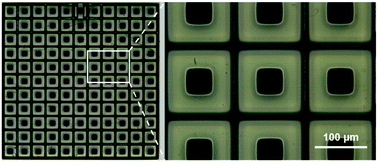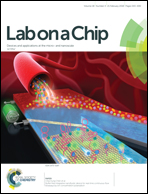3D printed high density, reversible, chip-to-chip microfluidic interconnects†
Abstract
Our latest developments in miniaturizing 3D printed microfluidics [Gong et al., Lab Chip, 2016, 16, 2450; Gong et al., Lab Chip, 2017, 17, 2899] offer the opportunity to fabricate highly integrated chips that measure only a few mm on a side. For such small chips, an interconnection method is needed to provide the necessary world-to-chip reagent and pneumatic connections. In this paper, we introduce simple integrated microgaskets (SIMs) and controlled-compression integrated microgaskets (CCIMs) to connect a small device chip to a larger interface chip that implements world-to-chip connections. SIMs or CCIMs are directly 3D printed as part of the device chip, and therefore no additional materials or components are required to make the connection to the larger 3D printed interface chip. We demonstrate 121 chip-to-chip interconnections in an 11 × 11 array for both SIMs and CCIMs with an areal density of 53 interconnections per mm2 and show that they withstand fluid pressures of 50 psi. We further demonstrate their reusability by testing the devices 100 times without seal failure. Scaling experiments show that 20 × 20 interconnection arrays are feasible and that the CCIM areal density can be increased to 88 interconnections per mm2. We then show the utility of spatially distributed discrete CCIMs by using an interconnection chip with 28 chip-to-world interconnects to test 45 3D printed valves in a 9 × 5 array. Each valve is only 300 μm in diameter (the smallest yet reported for 3D printed valves). Every row of 5 valves is tested to at least 10 000 actuations, with one row tested to 1 000 000 actuations. In all cases, there is no sign of valve failure, and the CCIM interconnections prove an effective means of using a single interface chip to test a series of valve array chips.



 Please wait while we load your content...
Please wait while we load your content...